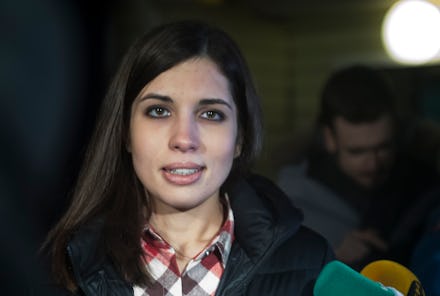The Real Reason Why Pussy Riot Has Been Freed From Prison

Vladimir Putin dropped a casual bomb on the international community on Thursday when, during an annual press Q&A, he announced his intent to release political prisoner Mikhail Khodorkovsky. The announcement came on the heels of sweeping amnesty legislation, which also releases several high-profile prisoners, including the two remaining members of Pussy Riot and 30 Greenpeace activists.
Putin stressed at the press event that he hasn't reversed any court decisions. In regard to Pussy Riot, he remained disgusted, telling reporters, "I feel sorry not because they went to prison, but because they committed that provocative act, which degraded women." That degrading, provocative act, of course, was a "punk prayer" smashing Putin from Moscow's iconic Christ the Saviour cathedral. He maintained that the law was not drawn up for the sake of Greenpeace or Pussy Riot, and that he hopes they have learned their lesson.
As for Khodorkovsky, the once-powerful oil magnate and political foe has been released after a decade in a Karelian prison. Putin called the pardon "guided by humanitarian principles," allowing the dissident to spend more time with his ailing mother. Khodorkovsky had already served two prison terms on the grounds of money laundering and fraud. His conviction was widely considered to be selective justice for a potential challenger and an opposition party benefactor.
At first glance, the stunt looks like a scramble to polish Russia's image ahead of the Sochi Olympics in February. Several heads of state have announced that they will not be attending the games, assumedly in protest of Russia's human rights abuses. By passing a bill releasing those who have committed non-violent acts (hooliganism) and female prisoners with young children, Putin has granted amnesty to an estimated 20,000 prisoners.
But while this may defray some criticism of the Kremlin, anti-LGBT laws remain unchanged. Activists will not back down from protesting Sochi, and chances are slim that President Barack Obama will change his mind and show up at the games in a Pussy Riot T-shirt.
Some say that the move is to take the heat off of Russia's foreign policy flops. The Ukrainian people have (very vocally) snubbed Putin's attempt to buy their fealty with $15 billion and a discount on oil and gas. For some, the Maidan protest is as much about turning to the West as it is about escaping Russian influence and corruption. Russia also continues to clash with the West over Syria, and negotiations have been slow and unfruitful.
And while these all seem like great reasons for a media blitz releasing high profile prisoners, they're unlikely. So why grant amnesty now?
Because, well, he can. And that's the problem.
Putin is showing the world that he can throw people in jail when he wants, and let them out when he wants. Justice in Russia is subject to his whim, and he feels comfortable enough from his seat of power to release those who once threatened it. He is showing that he is above the reach of outspoken musicians and rich oligarchs, and couldn't care less what you think of him. Whether Khodorkovsky immigrates to Germany or stays in Russia, he is no longer a threat to Putin's power. Pussy Riot will continue to perform, but Putin has made his point.
He has shown that he and he alone holds the decision on what constitutes hooliganism, or piracy, or tax evasion and fraud. He may have granted amnesty, but there is no victory here for justice or rule of law.